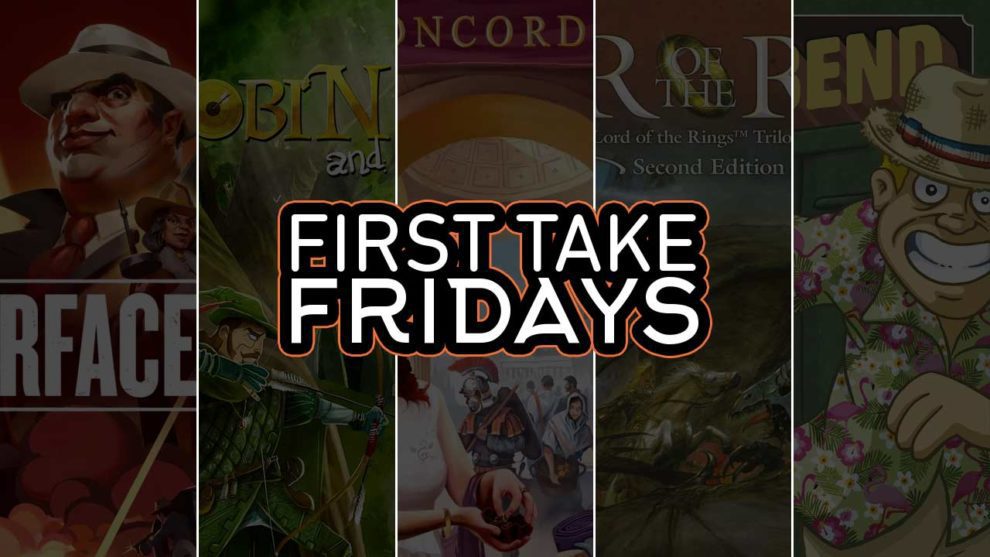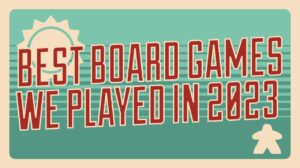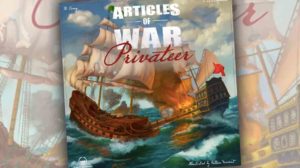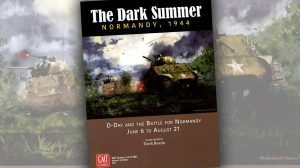Scarface 1920 – David Wood
Ever wonder what it was like to live in the roaring 20’s, the era of prohibition and mobsters? Well now you can in Scarface 1920. Each player controls a gang led by one of Chicago’s most infamous mobsters, including Al Capone. The game combines worker placement, deck building, action selection, area control, and resource management, among other mechanics. You use these mechanics to grow your territory, recruit new gang members, set up illegal speakeasies and nightclubs, bribe the police to look the other way as you run guns and alcohol, and much more.
There’s a lot going on in this game, so expect your first play to be a bit of a learning experience as you try to figure out your plan for each turn. Your plan is determined by the cards you play. Each card represents a gang member, and each provides varying amounts of two key resources – influence and power – along with special skills. When played, gang leaders can activate up to three of their unique special powers that can be quite powerful. But beware, even the best laid plans can be foiled by rival gangs or the authorities, including the Feds and Elliot Ness. The game may take some time to master, but it’s an absolute blast (no pun intended).
Ease of entry?:
★★★☆☆ – There were a few questions
Would I play it again?:
★★★★★ – Will definitely play it again
Read more articles from David Wood.
Robin Hood and the Merry Men – David McMillan
Robin Hood and the Merry Men has a bit of a learning curve as there are a lot of moving parts. It’s a semi-cooperative game about Robin Hood and, you guessed it, his Merry Men resisting the scourge of Prince John and the Sheriff of Nottingham via acts of guerilla warfare and banditry. Working together, the players must survive a number of rounds. Having done so, their contributions to the resistance are then measured against those of the others and the person that contributed the most wins.
While I can’t speak for higher player counts, I can say that, at just two players, there was never a moment where it felt like the game was going to get away from us. We never came perilously close to any of the three game ending conditions. It was quite the opposite, in fact. Whether that’s because my wife and I are experienced gamers or because the game wasn’t really designed with two people in mind, I couldn’t say. But we did have an enjoyable time nonetheless. I suspect that was partially because we were just glad to finally get the game to the table. Regardless, I hope to get this played at a higher player count someday. I suspect that just changing the player count will turn this light worker placement game into a tight one.
Ease of entry?:
★★★★☆ – The odd bump or two
Would I play it again?:
★★★★☆ – Would like to play it again
Read more articles from David McMillan.
Concordia – Bob Pazehoski, Jr.
I suppose arriving late to the party is better than missing the good stuff altogether. Concordia has been nestled up in a beloved gaming sweet spot for nearly a decade now, and it’s easy to see why. What looks like just another map of Europe on the surface reveals itself to contain a wealth of fascinating decisions in the cards. The mechanical beauty here is in the tension surrounding the personal deck—each card serves an immediate purpose while also providing an endgame bonus. The idea is to bring immediate needs into line with the long-term strategy to create a synergy that results in a lengthy move around the scoring track.
As a first-time play, the only real frustration comes from all scoring falling to the end of the game. There are really no hints of success and failure while trying to figure out exactly what’s going on around the Mediterranean. In our four-player affair, I tied for the low score, though I would say I figured out enough to be respectable. There is a wholly different learning curve in realizing what has been acquired and who among the competition is primed to sail past one hundred points. Though the scoring lurked in the shadows, I see nothing here that doesn’t beg for another play. Concordia is already on my wish list.
Ease of entry?:
★★★★☆ – The odd bump or two
Would I play it again?:
★★★★★ – Will definitely play it again
Read more articles from Bob Pazehoski, Jr.
War of the Ring: 2nd Edition – Andrew Lynch
That is one of the sweatiest onboardings I have ever had the displeasure of experiencing. An excellent rulebook and an excellent YouTube instructional video were no match for War of the Ring, which took an hour to set up for the first time and another hour of “Wait, so, how does that system work?” As is often the case, though, once the ball got rolling, the mechanical ease took over. I did not have a good time. Playing as the Free Folk, it was difficult to know how many of the losses I was taking were things to fret, and how many were perfectly alright. “The Free Folk are about managing collapse,” as a seasoned friend told me in an attempt to ease my distress. “If anything, you’re winning right now.” That’s impossible.
We called our game at about the halfway point, right when it was starting to feel good and intentional on both our parts. I think I might have loved it? I can’t wait to play it again? I would kill for a digital implementation? These are my thoughts. Feels like the edge of a deep ravine. Between this and Ankh: Gods of Egypt, I’m on a bit of a troops-on-a-map roll.
Ease of entry?:
★★☆☆☆ – Not an easy onboard
Would I play it again?:
★★★★★ – Will definitely play it again (If I can find someone)
Read more articles from Andrew Lynch
Feierabend (Finishing Time) – Andy Matthews
I’ve definitely been on a Friedemann Friese kick lately, his games feel very unique and innovative, with an interesting combination of mechanics and themes. Feierabend is the most recent game of his that I’ve played and I like it quite a lot. The marketing material bills it as the “the after-worker placement” game because instead of sending your workers from “home” out to work, you’re sending them from the factory floor out to do various leisure activities, including bike riding, amusement parks, or even on vacation…all in a quest to earn points or “relaxation”.
What Feierabend does really well is serve as a pretty decent mirror of the typical blue collar life–working to pay the bills, behind the 8 ball, etc. Your workers attempt to gain relaxation at the pace of 1-4 or so at a time, then they lose 16 relaxation when they inevitably come back to their 70 hour a week job. Thankfully Feierabend also includes the ability to improve your working conditions by way of decreasing working hours, increasing pay, and increasing vacation time.
There’s a lot to balance and it has the feeling of Power Grid where you need to constantly adjust multiple levers in order to be successful. And in a rare move, the real play time actually matches what’s on the box–you’ll “finish” Feierabend in around an hour. Just in time to head to the pub along with your work force.
Ease of entry?:
★★★★☆ – The odd bump or two
Would I play it again?:
★★★★★ – Will definitely play it again












